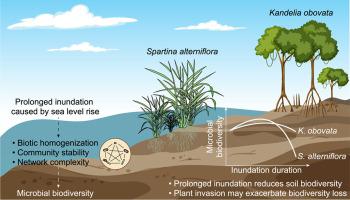当前位置:
X-MOL 学术
›
Soil Biol. Biochem.
›
论文详情
Our official English website, www.x-mol.net, welcomes your feedback! (Note: you will need to create a separate account there.)
Expedited loss of soil biodiversity in blue carbon ecosystems caused by rising sea levels
Soil Biology and Biochemistry ( IF 9.7 ) Pub Date : 2024-02-02 , DOI: 10.1016/j.soilbio.2024.109348 Gui-Feng Gao , Luyao Song , Yihui Zhang , Haiyan Chu
Soil Biology and Biochemistry ( IF 9.7 ) Pub Date : 2024-02-02 , DOI: 10.1016/j.soilbio.2024.109348 Gui-Feng Gao , Luyao Song , Yihui Zhang , Haiyan Chu

|
Global climate change poses a significant threat to soil biodiversity globally. Coastal wetlands are among the Earth's most extensive reservoirs of biodiversity that are susceptible to accelerating sea levels. However, in these vulnerable areas, the understanding of the responses of soil biodiversity to sea level rise remains elusive. In this study, we established an marsh organ and subjected it to a continuous inundation scenario by simulating the impact of sea level rise. Within this simulated environment, we planted monocultures of native mangrove species , alongside invasive species . After a year and a half of incubation, we conducted comprehensive analyses of the soil microbiome, encompassing archaea, bacteria, and fungi. Our findings revealed that the soil microbiome's response to prolonged inundation is characterized by non-linear dynamics, with moderate inundation levels proving advantageous for sustaining soil biodiversity. Except for fungal richness, the decline in biodiversity was markedly more pronounced in soils hosting than those hosting . This suggests that plant invasion may exacerbate soil biodiversity loss under increasing sea levels. While prolonged inundation enhanced biotic homogenization and community stability (measured by the average variation degree) of prokaryotic communities, this phenomenon did not extend to fungal communities. Additionally, soils subjected to moderate inundation levels exhibited heightened network complexity. Structural equation modeling analyses demonstrated that the duration of inundation primarily impacted soil biodiversity by modulating community stability and network complexity. Our results emphasize the intricate, non-linear nature of soil biodiversity responses to inundation gradients within coastal wetlands. This study provides empirical evidence that rising sea levels directly contribute to the loss of soil biodiversity within blue-carbon ecosystems. These findings hold significant implications for predicting the future shifts in soil biodiversity within these critical habitats, as sea levels continue to rise due to the ongoing effects of climate change.
中文翻译:

海平面上升导致蓝碳生态系统土壤生物多样性加速丧失
全球气候变化对全球土壤生物多样性构成重大威胁。沿海湿地是地球上最广泛的生物多样性库之一,很容易受到海平面上升的影响。然而,在这些脆弱地区,人们对土壤生物多样性对海平面上升的反应的了解仍然难以捉摸。在这项研究中,我们建立了一个沼泽器官,并通过模拟海平面上升的影响,将其置于持续的淹没场景中。在这个模拟环境中,我们种植了本土红树林物种和入侵物种的单一栽培。经过一年半的孵化,我们对土壤微生物组进行了全面分析,包括古细菌、细菌和真菌。我们的研究结果表明,土壤微生物组对长期洪水的响应具有非线性动力学特征,适度的洪水水平被证明有利于维持土壤生物多样性。除了真菌丰富度外,土壤中生物多样性的下降明显比土壤中更为明显。这表明植物入侵可能会在海平面上升的情况下加剧土壤生物多样性的丧失。虽然长时间的淹没增强了原核生物群落的生物同质化和群落稳定性(以平均变异程度衡量),但这种现象并没有扩展到真菌群落。此外,遭受中等淹没水平的土壤表现出更高的网络复杂性。结构方程模型分析表明,淹没持续时间主要通过调节群落稳定性和网络复杂性来影响土壤生物多样性。我们的结果强调了土壤生物多样性对沿海湿地淹没梯度的响应的复杂性、非线性性质。这项研究提供了经验证据,表明海平面上升直接导致蓝碳生态系统内土壤生物多样性的丧失。由于气候变化的持续影响,海平面持续上升,这些发现对于预测这些关键栖息地内土壤生物多样性的未来变化具有重要意义。
更新日期:2024-02-02
中文翻译:

海平面上升导致蓝碳生态系统土壤生物多样性加速丧失
全球气候变化对全球土壤生物多样性构成重大威胁。沿海湿地是地球上最广泛的生物多样性库之一,很容易受到海平面上升的影响。然而,在这些脆弱地区,人们对土壤生物多样性对海平面上升的反应的了解仍然难以捉摸。在这项研究中,我们建立了一个沼泽器官,并通过模拟海平面上升的影响,将其置于持续的淹没场景中。在这个模拟环境中,我们种植了本土红树林物种和入侵物种的单一栽培。经过一年半的孵化,我们对土壤微生物组进行了全面分析,包括古细菌、细菌和真菌。我们的研究结果表明,土壤微生物组对长期洪水的响应具有非线性动力学特征,适度的洪水水平被证明有利于维持土壤生物多样性。除了真菌丰富度外,土壤中生物多样性的下降明显比土壤中更为明显。这表明植物入侵可能会在海平面上升的情况下加剧土壤生物多样性的丧失。虽然长时间的淹没增强了原核生物群落的生物同质化和群落稳定性(以平均变异程度衡量),但这种现象并没有扩展到真菌群落。此外,遭受中等淹没水平的土壤表现出更高的网络复杂性。结构方程模型分析表明,淹没持续时间主要通过调节群落稳定性和网络复杂性来影响土壤生物多样性。我们的结果强调了土壤生物多样性对沿海湿地淹没梯度的响应的复杂性、非线性性质。这项研究提供了经验证据,表明海平面上升直接导致蓝碳生态系统内土壤生物多样性的丧失。由于气候变化的持续影响,海平面持续上升,这些发现对于预测这些关键栖息地内土壤生物多样性的未来变化具有重要意义。



























 京公网安备 11010802027423号
京公网安备 11010802027423号